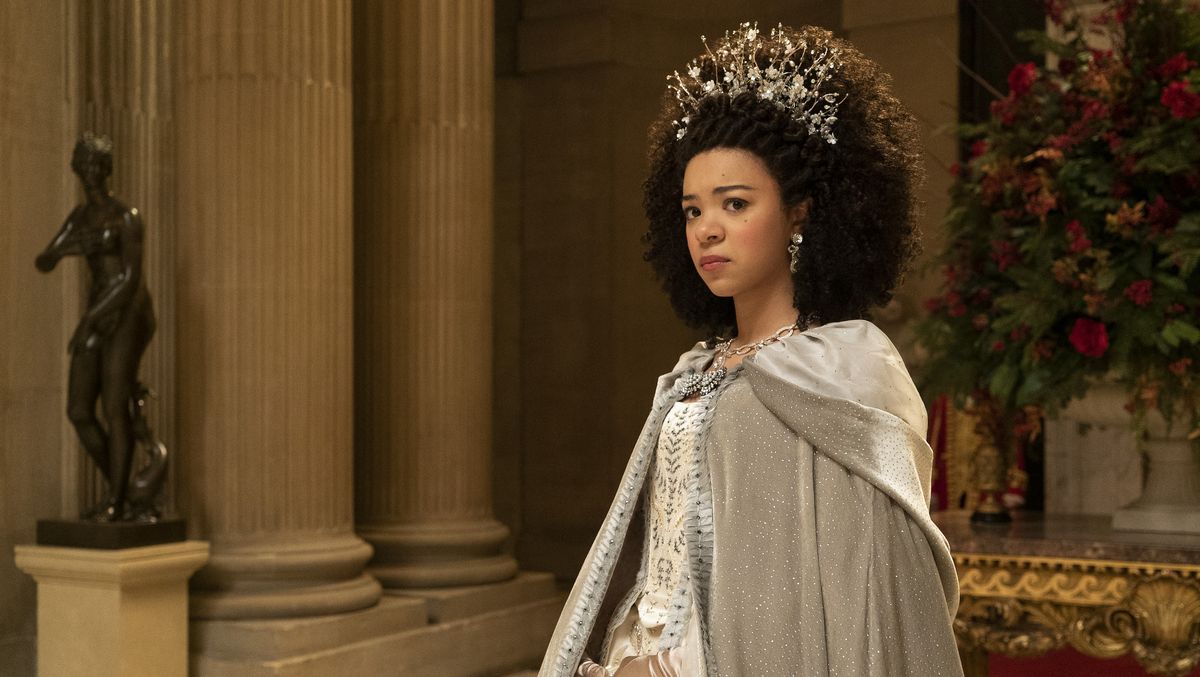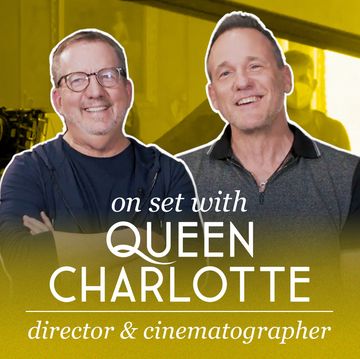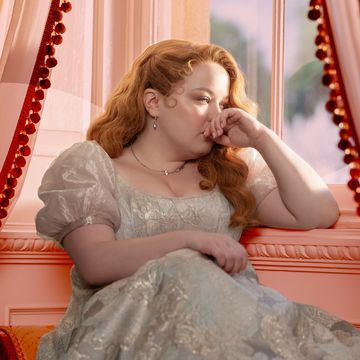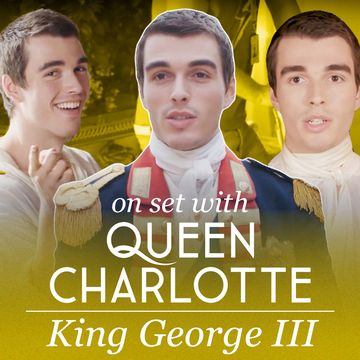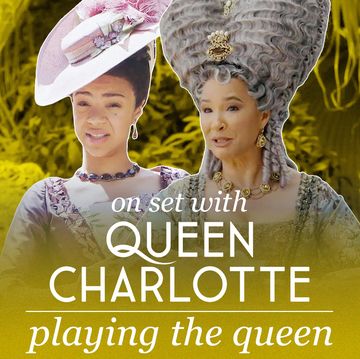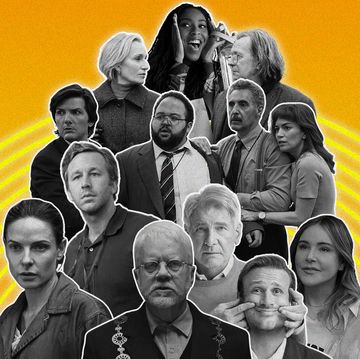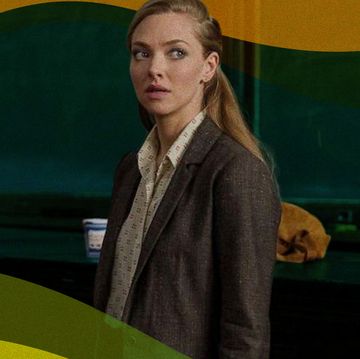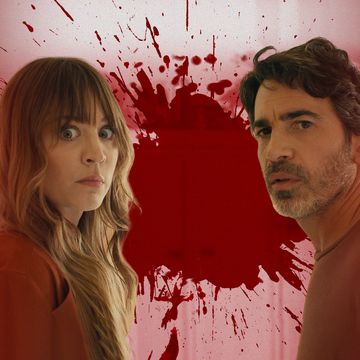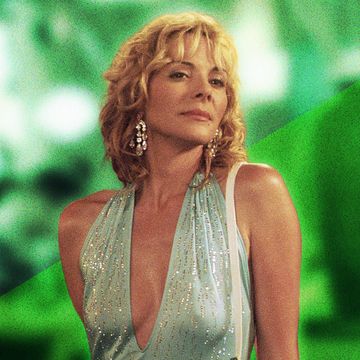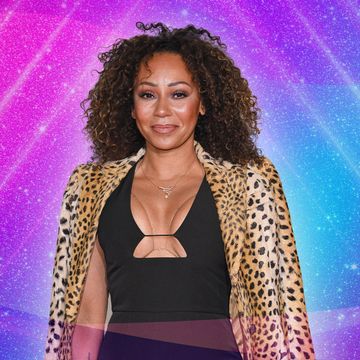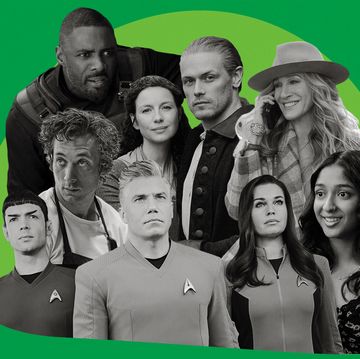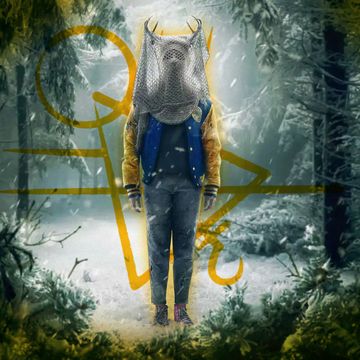Arsema Thomas describes playing the young version of Agatha Danbury in the Bridgerton prequel series, Queen Charlotte: A Bridgerton Story, now streaming on Netflix, as therapy. Almost.
“She’s the kind of woman I would like to be,” Thomas says from their Los Angeles hotel room on the morning of the show’s premiere. “How generous is it to get a step-by-step plan for how to be that woman? Like, she wasn’t just born this way — constantly defiant — but rather it was the side effect of the situations that she found herself in.”
Thomas knew there was a high bar as they entered the role of young Danbury. Adjoa Andoh had already turned so many heads as Lady Danbury in the first two seasons of Bridgerton, and in Queen Charlotte — which recounts how the young queen (India Amarteifio) rose to prominence and power alongside not just her husband, King George (Corey Mylchreest), but also a burgeoning support system that includes young Agatha — Andoh continues to portray both conviction and compassion interchangeably while still giving us the typical Danbury quips for which we’ve come to love her.
“I thought [my character] was so different from Lady D in Bridgerton,” says Thomas. “Which made me feel much more calm about walking into this woman’s shoes because it meant that I could honor the growth of what it takes to get from a woman who doesn’t realize her power into one of the strongest characters on the show.”
And so it was. Thomas — who’d only done one small film in South Africa prior to getting cast as young Agatha — fell madly in love with Lady Agatha Danbury from the very first audition. And upon reading the scripts, they were even more grateful for the three-dimensional exploration of this woman, especially given that so often, women, and women of color in particular, don’t get that on-screen.
With Shonda Rhimes’ Queen Charlotte, though, it’s the very point of the story. Sure, the series centers around the love story between young George and Charlotte, but at the heart of it all is the dynamic strength needed by the women of the ton to withstand heartbreak, hardship, and the very heavy weight of the crown itself.
The golden opportunity of being a part of the Bridgerverse is not lost on Thomas, who was still finishing drama school in London when they auditioned for Queen Charlotte. Their life had been going down a very different path — they graduated with a degree in biophysics from Carnegie Mellon and went on to get their master’s in health policy and epidemiology from Yale — when they did a 180 to pursue their childhood dream of becoming a professional actor.
“I packed up everything and moved to Paris because I wanted to do acting 100 percent of the time,” says Thomas. “It was always something I had wanted to do, [but] I didn’t think I would be able to. I thought it was going to be a hobby or a thing that I’d have to suppress in myself for the rest of my life.”
As their hotel phone rings and people knock on their door, presumably their team to help them get ready for the Los Angeles premiere of Queen Charlotte, Thomas is indeed in another life far from the one they thought they were supposed to live. And yet among the to-do, the excitement of it all, the very palpable way it feels like their career is going to soar from here, Thomas graciously takes a moment to answer questions about what made them want to take on the role of Agatha Danbury, the spectrum of sex scenes their character gets to display, and the true friendship that has sprouted between them and their co-star Amarteifio.
Light spoilers for Queen Charlotte: A Bridgerton Story follow.
VALENTINA VALENTINI: Were you a Bridgerton fan before coming on to Queen Charlotte?
ARSEMA THOMAS: I had never watched the show prior to getting the first audition, and maybe into the third or fourth round of auditions, I still hadn’t watched it. It was only when they were like, “Okay, maybe you should keep your schedule open,” that I thought maybe I actually need to do the work now. So, no, I’d never watched it. I wasn’t a fan, per se. [Pause.] I wasn’t not a fan, but just, yeah …
VV: Don’t worry. You won’t get in trouble for saying you weren’t a fan! I mean, really, if you didn’t like it, I can’t imagine you’d have taken this role.
AT: It wouldn’t have made any sense! And it was only after watching the show that I realized the gravity of the project. Like, it’s not just a job — it is something that really means something to a lot of different people. So, I think it takes a full-on dedication to enter the universe and also make sure that you execute it for the audience.
VV: You said it means something to a lot of people — what does it mean to you?
AT: There is this refreshing aspect of telling a version of a story that we kind of all know, this period piece with these romantic dalliances, and then bringing in a whole different group of people to create a very subtle secondary narrative about diversity, about gender, about race, inclusion, and ageism. I’ve never seen something like that on TV before, and I found it to be revolutionary. Look, I watched Scandal and How to Get Away With Murder multiple times while growing up. Those were the shows that lit the fire under my ass to become an actor because it wasn’t until I watched those shows that I saw dark-skinned women at the lead of anything complex and intelligent where they weren’t the butt of a joke or only there to support a whiter character’s narrative. To see that there is a space where my story can be told, where I can be a character who is just as complex as I am, it was one of those moments where you gain just a bit of confidence that you’re going in the right direction. To be a lead of a show like Queen Charlotte, it’s almost like I can undo all of the trauma that was done to me as a little girl watching TV — all those weird things that were on TV in the early noughties.
VV: Is it repetitive, then, to ask what it was that made you want to play her?
AT: There’s nothing that didn’t make me want to play her! That’s the thing — everything about her, she’s so different to women I’ve seen on-screen before. She has children, but she’s not motherly; she has a husband, but she doesn’t enjoy wifely duties. She reminds me of my mother, actually, and that is beautiful because now I can finally understand my mother in a new way. But anyway, yes, the list is long as to why I wanted to play her.
VV: Did you have much interaction or communication with Adjoa Andoh at any point in the filming process?
AT: We had a lot. After the first table read, we had a three-hour-long Zoom call. We were both sick in our own individual beds and just chatted for so long about random thoughts that we had for the character. Like, what’s her favorite color? Does she have a peanut allergy? How does she feel when she takes off her shoes after a long day? All these small things that are not in the script, but they allowed me and Adjoa to connect on secrets that only we knew. When we were filming, there would be moments where Adjoa was about to wrap and I’d be walking on set, and it was very much a passing-the-baton kind of thing.
It was a true collaboration because when Adjoa first made decisions for the role, Queen Charlotte had not been written, and the role is much smaller in the books. So, a lot of the things that were in the script were also new to her. I think our conversation leveled the playing field and allowed me to have confidence that we are both going into this with a lot of unknowns. It meant that some decisions Adjoa had made, she had to undo, which gave space for me to make decisions that then informed her performance in Queen Charlotte. It was just a hundred percent collaborative in one of the most flawless ways.
VV: Besides finally watching all of Bridgerton, what else did you do to prepare to play young Agatha?
AT: I had to understand a lot of the minute details and social norms of this world, so I read history books for that. I had no idea what a “ton” was! But what was really important for me was to make sure that as much of her strength as possible was shown, and her vulnerability is also there and honored. For that, I read a lot of books written by women I thought were similar or women I thought would look up to Agatha, or vice versa. I read Toni Morrison, I read bell hooks, I read the autobiographies of Angela Davis and Assata Shakur, I read [Zora Neale Hurston’s] Their Eyes Were Watching God — just anything that had a defiant Black woman in any part of the narrative to home in on what that thought process was. I also made waist beads for the character to ground her in that West African narrative.
VV: Can you tell us more about what waist beads are?
AT: In West African culture, you wear waist beads for fertility, to define femininity; there are a lot of different meanings for them. And because Lady Danbury is from Sierra Leone, it made sense to me. So, I went to a specific place in London and described Agatha to the woman, and she created a pattern for waist beads that I wore throughout all of filming. I’m still wearing it because of press. And then when all of this is done, I’ll have to take them off.
VV: Agatha’s intimate scenes show sex at different ends of the spectrum — tell me about your thoughts behind the scenes with Lord Danbury as opposed to the scenes with Lord Ledger.
AT: With Lord Danbury, that act is one of duty — it’s a chore; it’s gotta get done. She kind of just uses that time as her own downtime. Unfortunately, that’s relevant to a lot of women, I think. You see her in a place devoid of all sexual pleasure, and then you see her in a place where she realizes, “This can be just as enjoyable for me as it is for him!” She’s never even realized that she’s been scammed out of a good time until she’s with Lord Ledger. But what was so interesting was that in both of the scenes, as an actor, they felt the same. And a lot of that is because I’m held by the intimacy coordinator in the same way — we break the intimate scene down in the exact same way no matter what is happening. It’s like putting moments into little compartments: This is a small scene where you just touch her arm, and then this is a small scene where you lay her down. It breaks it up so it’s not this big, overwhelming sex scene and more just small bits of dialogue with no actual words. In both cases, whenever Tom [Verica] yelled cut, we would check in with each other; we would take a breath. It’s so interesting to watch it back and see the tonal differences of those scenes when in reality both had the same amount of comfort for me.
VV: I think the relationship Agatha has with Ledger is important in a way. In this world where so often it’s all about this crazy, passionate love, we get to see a sexual relationship that seems to benefit both people for being exactly what it is. Do you see it that way at all? Or maybe a totally different way!
AT: I think both these people are in really strict relationships, and they’ve found each other at the least opportune time. But the connection can’t be denied. I mean, no one has asked Agatha a question, like, ever! When it comes to the intellectual space of conversation, she’s just treated as if she has nothing interesting to say. For her to connect with this man who takes her on walks and discusses theory and looks at life more philosophically, and she gets to challenge him as well, they both realize that it’s a moment of freedom. They also realized the stakes of what that means, and I think both of them come to the decision that it’s too high of a price to pay for that little bit of freedom they get to have when they’re with each other. That’s the reason they both walk away. Well, Ledger does it first, but Agatha recognizes and doesn’t really fight back. In that moment when Ledger ends it, she realizes she will never not be a woman, she will never not be Black, and because of that, she’s always going to be held to a certain standard that she has no control over. For the longevity of her happiness, she decides to walk away as well.
VV: Do you think that has a direct effect on why she chooses to not marry Adolphus?
AT: I think the two are related, but she doesn’t marry Adolphus because she recognizes that every marriage kind of looks the same. The thing she doesn’t want is to be tied down. Lord Ledger wasn’t going to tie her down because he would never marry her — he has a wife and children. But Adolphus would, and the reality that she has now put herself in the same situation that she was just in with Lord Danbury keeps her from saying yes. And the issue isn’t whether the man has a good personality or not, but rather the institution of marriage is the issue. She’d rather be alone.
VV: One of my favorite parts of this series is the conversation in the art gallery between Lady Danbury and Lady Bridgerton about opening up to each other. The seeds of that are sown with how Agatha just sort of gets down to brass tacks and tells Charlotte the things no one else will tell her.
AT: When it comes to female friendships, you see a very honest and genuine version of all of the women that you don’t see when they’re not in the company of their female friends. It exposes the value in that type of platonic companionship that tends to be overlooked in the face of romantic companionship. And we definitely discussed that — the equality and the place that both types of relationships hold in a person’s life. But specifically when it comes to power dynamics, you see Agatha be the most honest person to Charlotte because she knows that honesty is probably what is going to make her the happiest, the most successful version of herself. Both India and I clocked in on that dynamic organically and independently of each other just by being Black women in white spaces. It’s that Black nod moment, that “I get you” in a way that is unspoken because we have been treated the same by the world. So, let’s undo that by being friends rather than enemies, by being confidantes in the most special way, and that is what Agatha tries to do for Charlotte, and also for Violet in that scene. Agatha can tell that Violet is holding on to something, and I think because Agatha has released herself of all those pressures long ago, she feels generous enough to help other people with that journey themselves.
VV: From the outside, it feels like this on-screen friendship between Agatha and Charlotte is also happening off-screen. Is that true? Please tell us it’s not all for the cameras!
AT: Oh, our friendship came so organically. From the moment we walked into the chemistry test read together, it was kind of just there. We didn’t have to try. I mean, we came in wearing the exact same outfit! It was the most bizarre thing. Also, she’s a younger sister, I’m an older sister, and we initially slotted into those places, but as filming went on, we realized that we were equals and just could be friends rather than a mentor-mentee dynamic. Honestly, it was just the most unplanned, effortless thing.
VV: What was the outfit you both wore?
AT: It was dark washed jeans, white Nike Air Forces, and a black top, and our hair both pulled back. It was creepy [laughs]. I feel like they must have a video of it somewhere from the audition.
VV: That’s so funny! Now, just lastly, how do you feel about navigating the juggernaut that is the Bridgerverse?
AT: I feel excited! I think because of the daunting amount of content there is, specifically with streaming platforms, as an actor walking into this industry for the very first time, it is a safety net to know that there is an audience that is already there supporting this narrative. But also, I have to make sure that I do the best job possible because this show doesn’t only have fans; there are the book fans too. There are layers of investment on the part of the audience, and I felt pressure to execute to my 100 percent ability. But I also relinquished myself from that, knowing that this is a different type of story. It isn’t another season of Bridgerton — this is Queen Charlotte: A Bridgerton Story. It’s meant to be different.
Valentina Valentini is a London-based entertainment, travel, and food writer and is also a senior contributor to Shondaland. Elsewhere, she has written for Vanity Fair, Vulture, Variety, Thrillist, Heated, and The Washington Post. Her personal essays can be read in the Los Angeles Times and Longreads, and her tangents and general complaints can be seen on Instagram at @ByValentinaV.
Get Shondaland directly in your inbox: SUBSCRIBE TODAY

